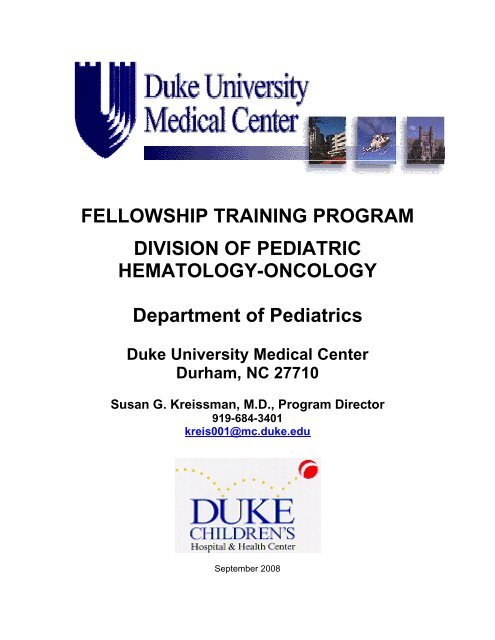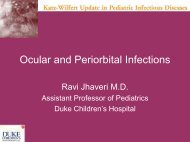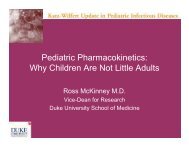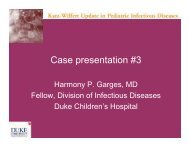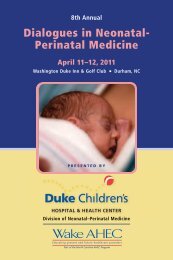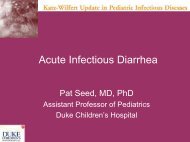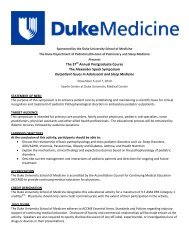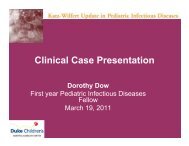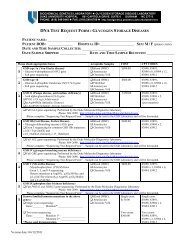2009 Pediatric Hematology/Oncology Fellowship Brochure
2009 Pediatric Hematology/Oncology Fellowship Brochure
2009 Pediatric Hematology/Oncology Fellowship Brochure
Create successful ePaper yourself
Turn your PDF publications into a flip-book with our unique Google optimized e-Paper software.
FELLOWSHIP TRAINING PROGRAMDIVISION OF PEDIATRICHEMATOLOGY-ONCOLOGYDepartment of <strong>Pediatric</strong>sDuke University Medical CenterDurham, NC 27710Susan G. Kreissman, M.D., Program Director919-684-3401kreis001@mc.duke.eduSeptember 2008
<strong>Pediatric</strong> <strong>Hematology</strong>-<strong>Oncology</strong> <strong>Fellowship</strong> ProgramThe <strong>Pediatric</strong> <strong>Hematology</strong>-<strong>Oncology</strong> <strong>Fellowship</strong> Training Program at Duke UniversityMedical Center is designed to provide a diversified, organized educational environmentthat will allow the fellow to develop both the clinical and research skills necessary tobecome an academic pediatric hematologist/oncologist. The program is dedicated todeveloping individual careers by providing a strong basic foundation in clinical andlaboratory research that allows each trainee freedom to choose their career goals.To prevent distractions and allow fellows to concentrate on acquiring their clinical andresearch skills, the fellowship is divided into one clinical year and two years dedicated toresearch. The first year of fellowship is an intensive clinical experience designed toallow the fellow to develop skills in diagnosis and current therapy for pediatrichematologic and oncologic problems. By providing a broad exposure to both commonand unusual problems in pediatric hematology, oncology, neuro-oncology, and bloodand marrow transplant the fellow will become competent in treating oncologic andhematologic disorders in children. The first year will also expose the fellow to manyareas of potential research.During the second and third year of training, the fellow’s time is committed to learningthe principles of laboratory research or, if specifically requested, pursuing formal trainingin clinical research design and implementation.Throughout all three years of training, the fellow maintains a weekly continuity clinic thatprovides the opportunity to care for patients longitudinally and to continually improveclinical skills. Fellows establish an ongoing relationship with patients and their familiesand, under the guidance of a faculty member in pediatric hematology-oncology, takeprimary responsibility for establishing chemotherapy treatment plans, participating insurgical and radiotherapy treatment decisions, and treating complications of a diseaseor its therapy.At the completion of the three year program, the fellow will have acquired the skills andexpertise necessary to meet or exceed the educational requirements for the Sub-Boardof <strong>Pediatric</strong> <strong>Hematology</strong>/<strong>Oncology</strong> of the American Board of <strong>Pediatric</strong>s.Division of <strong>Pediatric</strong> <strong>Hematology</strong>-<strong>Oncology</strong> at Duke University Medical CenterMembers of the Division provide a comprehensive range of medical services for infants,children, adolescents and young adults with malignant diseases and non-malignantblood disorders. Care is provided by a coordinated team consisting of physicians,nurses, nurse practitioners, physician’s assistants, social workers, psychologists,activities therapists, pharmacists and nutritionists.Members of the Division are actively engaged in cutting-edge laboratory and clinicalresearch in hematology and oncology. As a full institutional member of the Children's<strong>Oncology</strong> Group (COG), all members of the Division are actively involved in national1
clinical trials. Several Duke Faculty members are appointed to leadership roles withinthe COG and have served as national protocol coordinators in neuroblastoma, ALL, andrhabdomyosarcoma. Other members of the Division are internationally recognizedleaders who direct national trials in sickle cell disease and cord blood transplantation.Other areas of expertise within the Division include therapy for autoimmune blooddisorders, myelodysplastic syndromes, hemophilia, hemostasis and thrombosisdisorders. A multidisciplinary clinic for long-term survivors of childhood cancer hasbeen operational since 1998.The transplant division at Duke is the largest pediatric transplant program in the country.Patients with high-risk and refractory malignancies, bone marrow failure syndromes,immunodeficiency syndromes, and inborn errors of metabolism are treated with stemcell transplantation using bone marrow, mobilized peripheral blood, and umbilical cordblood. Approximately 90% of the patients receive allogeneic grafts and 10% receiveautologous grafts. The Carolinas Cord Blood Bank, a public cord blood banking facility,and the Stem Cell Laboratory are part of the transplant program. Dr. Joanne Kurtzberg,Chief of the Division, has pioneered the use of unrelated umbilical cord blood cells as asource of stem cells for patients who do not have an acceptable bone marrow donor.Use of cord blood cells to treat inherited metabolic disease is a recent emphasis of theprogram. The Stem Cell Laboratory is active in the areas of stem cell differentiation, exvivo expansion of cord blood cells and immune reconstitution post transplant.<strong>Pediatric</strong> hematology, oncology, and transplant patients are cared for in The DukeChildren's Health Center, a state-of-the-art outpatient facility that opened in the spring of2000. The pediatric hematology-oncology program occupies the fourth floor of theChildren’s Health Center and consists of 15 exam rooms and 2 procedure rooms withaccess to a dedicated pediatric laboratory and pharmacy are available on the fourthfloor, and a 20 bed pediatric day hospital. Duke Children’s Hospital is located on the fifthfloor of Duke Hospital with 165 pediatric beds including a pediatric intensive care unit,neonatal intensive care unit and full term nursery, inpatient wards and step down unit.<strong>Pediatric</strong> hematology and oncology patients are hospitalized on this designatedpediatric floor, which includes a 16-bed dedicated state of the art pediatric stem cellisolation unit.2
The Clinical Neuro-<strong>Oncology</strong> Program at Duke University Medical CenterThe clinical neuro-oncology program at Duke is world renowned for its interdisciplinaryapproach to the care of pediatric and adult brain tumor patients. The Brain TumorCenter is one of only three national brain tumor research centers recognized by theNational Institutes of Health. Dr. Henry Friedman is the co-director of the Brain TumorCenter and Dr. Sridharan Gururangan directs the pediatric neuro-oncology program.The <strong>Pediatric</strong> <strong>Hematology</strong>-<strong>Oncology</strong> <strong>Fellowship</strong> CurriculumThe first year of the fellowship program is an intensive clinical experience designed toallow the fellow to develop skills in diagnosis and management of pediatric hematologyoncologyproblems. Fellows rotate on the three in-patient services (<strong>Hematology</strong>-<strong>Oncology</strong>, Bone Marrow Transplantation, Neuro-<strong>Oncology</strong>) as well as two week minirotationsin Radiation <strong>Oncology</strong>, <strong>Hematology</strong> and Clinical Laboratory, Hematopathology,and the <strong>Pediatric</strong> Bone Marrow Transplant Outpatient Clinic.The rotations are divided as follows:RotationNumber & DurationIn-patient <strong>Hematology</strong>-<strong>Oncology</strong>4 monthsBone Marrow Transplantation3 monthsNeuro-<strong>Oncology</strong>1 monthMini-Rotations *2 weeks eachVacation4 weeks* Rotations include experiences in Radiation <strong>Oncology</strong>, <strong>Hematology</strong> and ClinicalLaboratory, Hematopathology and <strong>Pediatric</strong> BMT Outpatient Clinic.3
During the second and third years, fellows pursue independent research and can selectfrom all laboratories on the campus of Duke University. In addition, fellows may takecourses in biostatistics and clinical trials design offered by faculty in the Duke ClinicalResearch Institute.Fellows participate in the night and weekend call schedule on <strong>Hematology</strong>-<strong>Oncology</strong>and Blood and Marrow Transplant throughout the three years of the program. Call isfrom home with immediate faculty back-up available.In addition to the daily instruction that fellows receive from faculty on the inpatientservices, and mini-rotations, there are clinical conferences designed to enhance thefellows’ learning experience. These include:‣ <strong>Hematology</strong> Teaching Conference (weekly)‣ <strong>Oncology</strong>/Stem Cell Transplant Teaching Conference (weekly)‣ Tumor Board (biweekly)‣ PHO Research Conference (monthly)‣ <strong>Pediatric</strong> Fellows Research Conference (monthly)‣ <strong>Hematology</strong>-<strong>Oncology</strong> Patient Care Conference (weekly)‣ Social Service/Psychosocial Conference (bimonthly)‣ Morbidity and Mortality Conference (bimonthly)‣ Blood and Marrow Transplant Patient Conference (weekly)‣ Hematopathology Conference (biweekly)‣ Protocol Conference (monthly)‣ Journal Club (bimonthly)Fellows learn academic teaching skills by participating in the education of <strong>Pediatric</strong>Housestaff and medical students through informal teaching on the clinic and wardservice teams as well as by presenting formal didactic lectures on topics in pediatrichematology-oncology for fellows, housestaff, and students. The Tumor Board, ProtocolConference and Journal Club discussions are presented by fellows with facultymentoring.4
The Faculty:Daniel S. Wechsler, M.D., Ph.D.Division Chief, <strong>Pediatric</strong> <strong>Hematology</strong>-<strong>Oncology</strong>Associate Professor of <strong>Pediatric</strong>s919-684-3401dan.wechsler@duke.eduMichael B. Armstrong, M.D., Ph.D.Medical InstructorDivision of <strong>Pediatric</strong> <strong>Hematology</strong>-<strong>Oncology</strong>919-684-3401michael.armstrong@duke.eduRaymond C. Barfield, M.D., Ph.D.Associate Professor of <strong>Pediatric</strong>sDivision of <strong>Pediatric</strong> <strong>Hematology</strong>-<strong>Oncology</strong>raymond.barfield@mc.duke.edu5
The Faculty (cont'd.):Timothy A. Driscoll, M.D.Assistant Professor of <strong>Pediatric</strong>sDivision of <strong>Pediatric</strong> Blood and Marrow Transplant919-668-1100drisc002@mc.duke.eduJohn M. Falletta, M.D.Chairman, Duke Institutional Review BoardProfessor of <strong>Pediatric</strong>s919-684-3401john.falletta@duke.eduHenry S. Friedman, M.D.Director, Division of Neuro-<strong>Oncology</strong>Professor of <strong>Pediatric</strong>sThe Preston Robert Tisch Brain Tumor Center at Duke919-684-5301fried003@mc.duke.eduSridharan Gururangan, MRCP(UK)Director, <strong>Pediatric</strong> Clinical Services, Neuro-<strong>Oncology</strong>Associate Professor of <strong>Pediatric</strong>sThe Preston Robert Tisch Brain Tumor Center at Duke919-668-6288gurur002@mc.duke.eduEugene I. Hwang, M.D.Medical InstructorDivision of <strong>Pediatric</strong> <strong>Hematology</strong>-<strong>Oncology</strong>919-684-3401eugene.hwang@duke.eduThomas R. Kinney, M.D.Wilburt C. Davison Professor of <strong>Pediatric</strong>sAssociate Chair, <strong>Pediatric</strong>sDivision of <strong>Pediatric</strong> <strong>Hematology</strong>-<strong>Oncology</strong>919-684-3401kinne001@mc.duke.edu6
The Faculty (cont'd.):Susan G. Kreissman, M.D.Director, <strong>Hematology</strong>-<strong>Oncology</strong> <strong>Fellowship</strong> ProgramDirector, Neuroblastoma ProgramDirector, Clinical <strong>Oncology</strong> ServiceAssociate Clinical Professor of <strong>Pediatric</strong>sDivision of <strong>Pediatric</strong> <strong>Hematology</strong>-<strong>Oncology</strong>919-684-3401susan.kreissman@duke.eduJoanne Kurtzberg, M.D.Chief, Division of <strong>Pediatric</strong> Blood and Marrow TransplantProfessor of <strong>Pediatric</strong>s919-668-1100kurtz001@mc.duke.eduCatherine P. Lavau, D.V.M., Ph.D.Visiting Associate Professor of <strong>Pediatric</strong>sDivision of <strong>Pediatric</strong> <strong>Hematology</strong>-<strong>Oncology</strong>919- 681-1997catherine.lavau@duke.eduCorinne M. Linardic, M.D., Ph.D.Molecular <strong>Oncology</strong>Assistant Professor of <strong>Pediatric</strong>sDivision of <strong>Pediatric</strong> <strong>Hematology</strong>-<strong>Oncology</strong>919-684-3401corinne.linardic@duke.eduPaul L. Martin, M.D., Ph.D.Clinical Director, Division of <strong>Pediatric</strong> Blood and Marrow TransplantAssociate Professor of <strong>Pediatric</strong>sDivision of <strong>Pediatric</strong> Blood and Marrow Transplant919-668-1100marti066@mc.duke.edu7
The Faculty (cont'd.):Cassandra Moran, D.O., PharmBSMedical InstructorDivision of <strong>Pediatric</strong> <strong>Hematology</strong>-<strong>Oncology</strong>919-684-3401cassandra.moran@duke.eduSuhag Parikh, M.D.Associate of <strong>Pediatric</strong>sDivision of <strong>Pediatric</strong> Blood and Marrow Transplant919-668-1100parik002@mc.duke.eduVinod Prasad, M.D.Assistant Professor of <strong>Pediatric</strong>sDivision of <strong>Pediatric</strong> Blood and Marrow Transplant919-668-1100prasa004@mc.duke.eduPhilip M. Rosoff, M.D.Director, Young Cancer Survivors ProgramDirector of Clinical Ethics, Duke HospitalAssociate Professor of <strong>Pediatric</strong>sDivision of <strong>Pediatric</strong> <strong>Hematology</strong>-<strong>Oncology</strong>919-684-3401philip.rosoff@mc.duke.eduPaul Szabolcs, M.D.Associate Professor of <strong>Pediatric</strong>sDivision of <strong>Pediatric</strong> Blood and Marrow Transplant919-668-1100szabo001@mc.duke.eduCourtney D. Thornburg, M.D.Co-Director, Duke Comprehensive Hemostasis and Thrombosis CenterDirector, Duke <strong>Pediatric</strong> Sickle Cell ClinicAssistant Professor of <strong>Pediatric</strong>sDivision of <strong>Pediatric</strong> <strong>Hematology</strong>-<strong>Oncology</strong>919-684-3401courtney.thornburg@duke.edu8
<strong>Hematology</strong>-<strong>Oncology</strong> Clinical Program Staff:PhysiciansDaniel S. Wechsler, M.D., Ph.D. - ChiefMichael B. Armstrong, M.D., Ph.D.Raymond C. Barfield, M.D., Ph.D.Eugene I. Hwang, M.D.Susan G. Kreissman, M.D.Corinne M. Linardic, M.D., Ph.D.Cassandra Moran, D.O., PharmBSPhilip M. Rosoff, M.D.Courtney D. Thornburg, M.D.Mid-Level ProvidersShelly Burgett, R.N., F.N.P.Nichol Dixon-Harris, R.N., C.P.N.P.Tracy Kelly, R.N., C.P.N.P.Heather McDaniel, R.N., C.P.N.P.Louise Minnich, R.N., C.P.N.P.Jennifer Newlin, PA-CSheila Perry, R.N.Cindy Lloyd, R.N.Social WorkersAnne Kosem, M.S.W., L.C.S.W.Laurie Sapperstein, M.S.W., L.C.S.W.Amanda Fleishman, M.S.W., L.C.S.W.9
Mesenchymal (Soft Tissue & Bone) Tumor ProgramSusan G. Kreissman, M.D.Corinne M. Linardic, M.D., Ph.D.Philip M. Rosoff, M.D.Daniel S. Wechsler, M.D., Ph.D.Brian Brigman M.D., Orthopaedic <strong>Oncology</strong>Donald P. Frush, M.D., RadiologyNicole Larrier, M.D., Radiation <strong>Oncology</strong>Rex C. Bentley, M.D., PathologyJohn F. Madden, MD, Ph.D., PathologyNeuroblastoma ProgramSusan G. Kreissman, M.D.Timothy A. Driscoll, M.D.Michael B. Armstrong, M.D., Ph.D.Daniel S. Wechsler, M.D., Ph.D.Hemophilia-CoagulationMichael B. Armstrong, M.D., Ph.D.Courtney D. Thornburg, M.D.10
Comprehensive Sickle Cell ProgramCourtney D. Thornburg, M.D.Michael B. Armstrong, M.D., Ph.D.Shelly Burgett, M.S.N., F.N.PTracy Kelly, M.S.N., C.P.N.P.Heather McDaniel, R.N., M.S. N., C.P.N.P.Cindy Lloyd, R.N.Amanda Mandy, R.N.Cancer Survivors ProgramPhilip M. Rosoff, M.D., <strong>Pediatric</strong> <strong>Oncology</strong>Carlos M. DeCastro, M.D., Internal Med/<strong>Oncology</strong>Nancy E. Friedman, M.D., <strong>Pediatric</strong> Endocrine11
Division of <strong>Pediatric</strong> Blood and Marrow TransplantJoanne Kurtzberg, M.D., ChiefTimothy A. Driscoll, M.D.Paul L. Martin, M.D., Ph.D.Suhag Parikh, M.D.Vinod Prasad, M.D., MRCPPaul Szabolcs, M.D.Jerelyn Moffet, C.P.N.PMichelle Schweitzer, C.P.N.P.Marie Ann Shonkwiler, C.P.N.P.Lauren Stafford, C.P.N.P.Susan Wood, C.P.N.P.Gilbert Ciocci, F.N.P.Debbie Semmel, F.N.P.Andre Stokhuyzen, C.P.N.P.Erika Summers, C.P.N.PMarion Kalbacker, M.S.W., L.C.S.W.Tina Blanton, M.S.W., L.C.S.W.Katie Johnson, M.S.W., L.C.S.W.Neuro-<strong>Oncology</strong> ProgramHenry S. Friedman, M.D., DirectorSridhanan Gururangan, MRCP(UK)Melody Watral, M.S.N.C., C.P.N.P.Jeanne Krauser, M.S.N.C., C.P.N.P.12
The Fellows:Name Residency ClassRobert Greiner, M.D. Inova Fairfax Hospital for Children 2006Clarissa Johnson, M.D. Cincinnati Children’s Hospital 2006Poulomi Pai, M.D. LSU Health Sciences Center 2006Nirmish Shah, M.D. East Carolina University 2007Jessica Sun, M.D. Duke University Medical Center 2007Jennifer Walker, M.D. Duke University Medical Center 2007Brian Belyea, M.D. University of Virginia 2008Rael Caspari, M.D. University of Texas Southwestern 2008Kathryn Wheeler, M.D. University of Florida 2008Lydia Boateng, M.D. East Tennessee State University <strong>2009</strong>Jessica Heath, M.D. Albany Medical Center <strong>2009</strong>David Van Mater, MD,Ph.D University of Michigan <strong>2009</strong>13
<strong>Pediatric</strong> <strong>Hematology</strong>/<strong>Oncology</strong> <strong>Fellowship</strong> Contact Information:Program DirectorSusan G. Kreissman, M.D.Division of <strong>Pediatric</strong> <strong>Hematology</strong>/<strong>Oncology</strong>Duke University Medical CenterRoom 222, Bell BuildingBox 2916Durham, NC 27710Telephone: 919-684-3401Fax: 919-681-7950Email: kreis001@mc.duke.eduProgram CoordinatorDeborah LasaterDivision of <strong>Pediatric</strong> <strong>Hematology</strong>/<strong>Oncology</strong>Duke University Medical CenterRoom 222, Bell BuildingBox 2916Durham, NC 27710Telephone: 919-684-3829Fax: 919-681-7950Email: deborah.lasater@duke.edu14
Duke University Medical Center, Duke University, and the TriangleIn 1924, one year after Duke University was established, James Buchanan Dukedonated $4 million to build a medical school with the goal of establishing the premiermedical center between Baltimore and New Orleans. Duke University Medical Center(DUMC) has earned its reputation as a center of excellence in patient care, researchand medical education. US News and World Report has ranked DUMC as one of thenation’s best hospitals for the 18 th straight year. Duke is the only hospital in thesoutheast to receive this honor. Once again, in the 2007 rankings, Duke was amongthe top ten hospitals in America.The Duke University Medical Center faculty is committed to medical education. DukeUniversity School of Medicine is one of the top medical schools in the country,graduating about 100 students per year. The <strong>Pediatric</strong> Residency Program is fullyaccredited by the American Council on Graduate Medical Education, with 14 pediatricresidents and 6 medicine-pediatric residents entering the program each year. Inaddition to the pediatric hematology-oncology fellowship, 13 other fellowship programsare offered within the Department of <strong>Pediatric</strong>s.Duke is located in the city of Durham, nicknamed the City of Medicine, which has apopulation of approximately 190,000 of whom 22,000 work in health care related fields.Durham is situated near the geographic center of the state, located between themountains of western North Carolina and the beautiful eastern coastal plain beaches.Durham, Chapel Hill, and Raleigh form the tri-city area known as the Triangle. In thecenter of the Triangle is Research Triangle Park, one of the oldest established hightechnology centers in the country. In addition, the University of North Carolina atChapel Hill is located only 11 miles away, North Carolina State University is 20 milesaway in Raleigh, and North Carolina Central University is located in Durham.The mix of educational institutions, research, and industry create a thriving academicenvironment and the area supports a vast range of cultural and recreational activities aswell. There are many diverse and excellent restaurants, numerous arts and sportingevents, not to mention the close proximity to both the picturesque North Carolinamountains and beaches.15
Useful websites for general information:Duke Universitywww.duke.eduDuke University Medical Centerwww.mc.duke.eduDuke University Department of <strong>Pediatric</strong>shttp://www.pediatrics.duke.eduDuke Children’s Hospitalwww.dukechildrens.orgCancer Center, Duke Children’s <strong>Pediatric</strong> <strong>Hematology</strong>/<strong>Oncology</strong> <strong>Fellowship</strong>http://cancer.duke.edu/pho/fellowship.asp<strong>Pediatric</strong> Blood and Marrow Transplanthttp://www.cancer.duke.edu/pbmt16


